EU Is Back in the Greece Mode
Adelina Marini, February 16, 2015
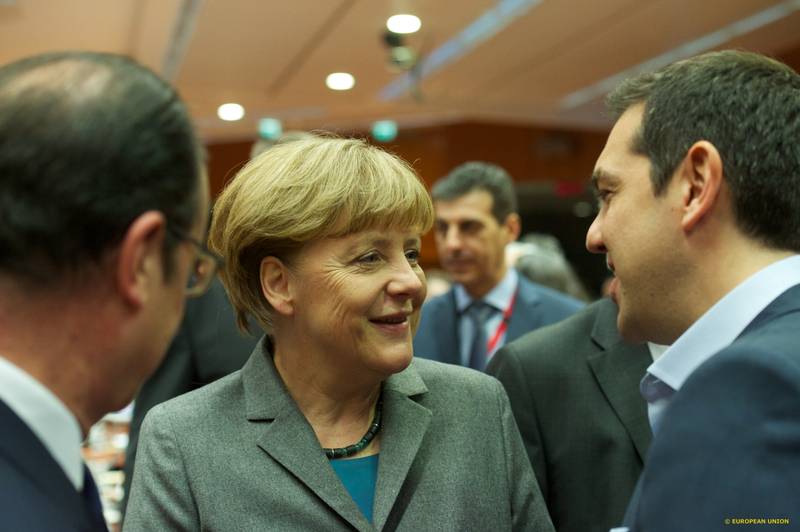 There is no doubt that the EU is again in a Greek mode. The issue of the future of Greece has again overtaken the agenda of the EU summits and of the Eurogroup meetings and has returned the feeling of frustration that was forgotten for a while. The big difference from the last time, however, is that in 2009, when everything began, the main drama was the survival of the euro area, whereas now, five years later, the main drama is Greece to understand what everyone elese in the euro area have understood in the past four years, namely that the elections could very well be national but the economies no longer are. The world does not begin and does not end with a government nor a new government is a sufficient condition to rewrite the rules of a community ruled by 28 governments, parliaments and public opinions.
There is no doubt that the EU is again in a Greek mode. The issue of the future of Greece has again overtaken the agenda of the EU summits and of the Eurogroup meetings and has returned the feeling of frustration that was forgotten for a while. The big difference from the last time, however, is that in 2009, when everything began, the main drama was the survival of the euro area, whereas now, five years later, the main drama is Greece to understand what everyone elese in the euro area have understood in the past four years, namely that the elections could very well be national but the economies no longer are. The world does not begin and does not end with a government nor a new government is a sufficient condition to rewrite the rules of a community ruled by 28 governments, parliaments and public opinions.
The debut of the new Greek government in the EU
The first participation of the new Greek Prime Minister Alexis Tsipras in the European Council has completely lived up to the fears of many in EU of a political phenomenon like Syriza which is not based on any other ideology but unbacked opportunism. In EU there are populists and populists. They differ depending on the national culture and mentality and by the reasons for their appearance. In Bulgaria we have a saying, which is probably inspired by Greece, "Storm the olives". It is used for people who are rushing to do something without having learned in advance what is that they are going to do, without having a clear plan or expectations from the consequences. Those are populists-nonrealists. People who have no connection with reality. Generally, populists promise voters things they want to hear. In most cases those are soft forms of populism. Syriza is a severe form of populism because it denies not only what had been agreed by previous legitimate governments but also the economic logic of a monetary union, no matter how imperfect it may be. Syriza behaves as if, indeed, the world starts from today and thanks to them.
The party has won the elections, expectedly, with unrealistic promises to remove all the institutions created during the crisis to save Greece and later all the other countries with financial problems. Greece has always been the patient zero, a different case because the crisis there was caused by many factors which in their majority are inherent - corrupt political elites, coiffured data to join the euro area, a violent street temper. Those are the reasons why the crisis hit the hardest in Greece. All the other factors (external), as Ireland and Portugal proved, can be resolved.
The aggressive wording of the far left party in the past days, including around the EU summit on 12 February has provoked in the Union some obvious or not so obvious jokes questioning the intellect of the new Greek government. For example, a senior EU official said that the technical work of the institutions "formerly known as the T-institutions (Troika)" has started. According to the source, the main discourse was political and the reading mode was abandoned but the time has come for a hard landing to the facts. And the facts are to be found in what "was previously known as the programme", the source continued in the same spirit. The reasons for the jokes are that at his first press conference after his debut on European stage Alexis Tsipras repeated several times that the Troika is over and the programme no longer exists. "Forget it! There is no Troika. The Troika no longer exists. The programme no longer exists", were Tsipras's words in the packed Greek national briefing room in Brussels.
His was the most anticipated press conference. The interest of the journalists was huge but the Greek prime minister failed to say anything different than what he stated during the election campaign and later. However, there was a slight change of the tone. May be as a result of the clash with the hard facts. But this failed to compensate the confusion from Mr Tsipras's controversial statements. On the one hand he said that the Troika and the memorandum were gone, but on the other hand he expected a "bridge agreement" to be concluded that would lead to a social contract with the European partners in the coming six months. He suggested that against such a contract Greece would have to commit to reforms, including such that ensure primary surplus in the budget (which is in the current programme and is expected this year), of the public administration, fight against corruption, reform of the judiciary and a technical solution for the debt. All of these things can be found in the former, according to Syriza, and the current, according to the EU, bailout programme.
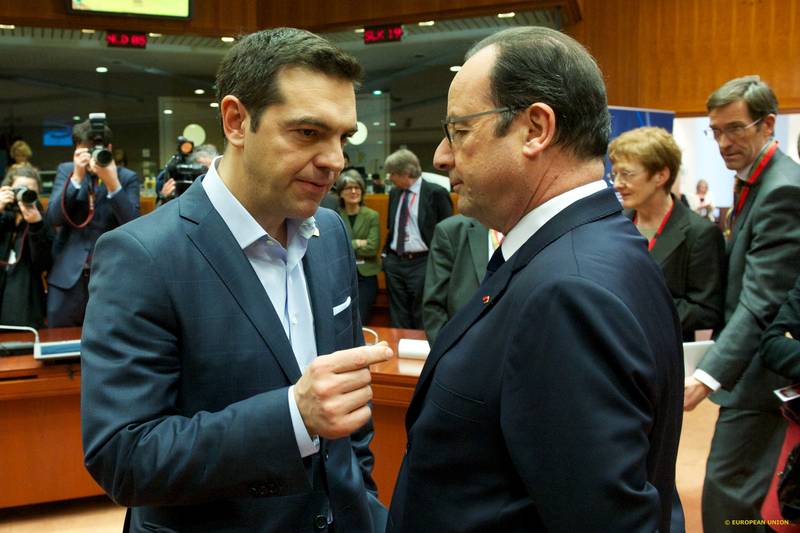 Mr Tsipras was outraged by the claims of leaders like Chancellor Angela Merkel or Eurogroup chief Jeroen Dijsselbloem that Greece did not present anything concrete. "Our proposal was very specific. Let' s hear from them then what their proposal is about how Greece can go back to growth". We are not pupils but equal partners, he emphasised and added that Greece had opinion of its own and its voice was heard in EU. Germany's proposal, and Germany is no longer alone, is that Greece should continue with the commitments of past governments, to do reforms and to pay its debts. In an opinion in The Financial Times last week, Jurgen Stark, a former member of the ECB governing council, wrote that no one was dictating anything to anyone. "The political elites of the eurozone periphery are responsible for having lost access to the financial markets in 2010. Years of mismanagement and failure to observe the rule of law have led to increasing budget deficits and mounting debts".
Mr Tsipras was outraged by the claims of leaders like Chancellor Angela Merkel or Eurogroup chief Jeroen Dijsselbloem that Greece did not present anything concrete. "Our proposal was very specific. Let' s hear from them then what their proposal is about how Greece can go back to growth". We are not pupils but equal partners, he emphasised and added that Greece had opinion of its own and its voice was heard in EU. Germany's proposal, and Germany is no longer alone, is that Greece should continue with the commitments of past governments, to do reforms and to pay its debts. In an opinion in The Financial Times last week, Jurgen Stark, a former member of the ECB governing council, wrote that no one was dictating anything to anyone. "The political elites of the eurozone periphery are responsible for having lost access to the financial markets in 2010. Years of mismanagement and failure to observe the rule of law have led to increasing budget deficits and mounting debts".
"It is not because of Germany that France is experiencing economic stagnation and Italy has suffered long-term recession. The problems are home made. They cannot be eliminated by the ECB or by fiscal stimulus", Mr Stark added underscoring that the principle of individual responsibility applies to Europe too and this will remain so until there is a political union with a proper democratic control. The same position expressed many times Finance Minister Wolfgang Scheuble.
And although currently the work on Greece's second bailout programme is frozen, legally it is still in force despite the statements of the Greek premier, said a well informed source in the EU. He gave the example of the Irish programme saying that no programme is static. In all of them changes are made depending on the economic context. The programme is not the holy book where nothing can be changed but, still, when changes are made we should be careful not to change the "theology" behind it, the source described the situation and again pointed at the Irish programme saying that it went through some serious changes "simply because there are intelligent people discussing the environment during a review".
Tsipras circus
The frustration and irony are provoked by Greece's behaviour in the past week in the EU. On the eve of the European Council on February 12th there was an extraordinary meeting of the Eurogroup the aim of which was to clarify what exactly Greece wants and negotiations to begin. After a several-hour marathon the negotiations ended without an agreement. Despite the huge expectations, Eurogroup chief Jeroen Dijsselbloem came out with very exhausted or may be angry appearance and announced that he had nothing to say. Throughout the evening there were rumours that the Eurogroup worked on a text of an agreement. Moreover, according to various sources close to the meeting, everything was completely agreed which is why many of the ministers went home. What was only needed was the Greek Finance Minister Varoufakis to get the final approval by Athens. He did not get it. According to Premier Tsipras, 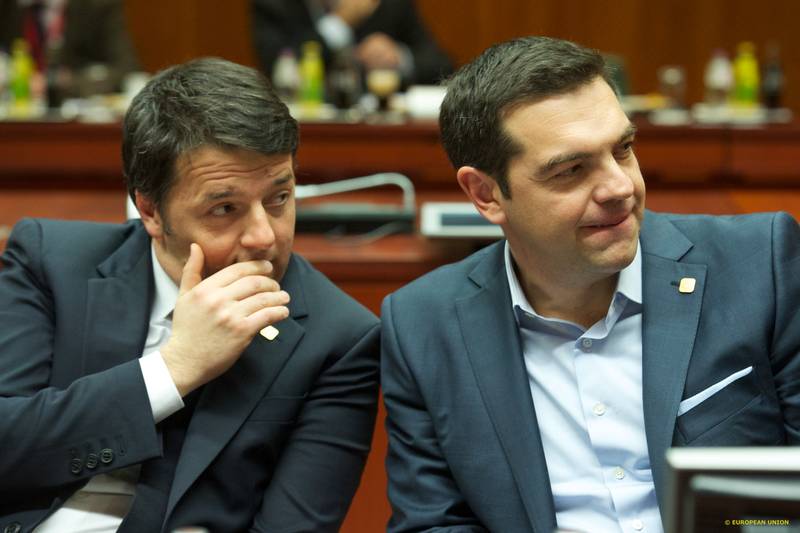 the decision to reject the text was collective and justified. He hoped that a decision would be found on Monday (February 16) when the Eurogroup is meeting again to discuss the Greek question.
the decision to reject the text was collective and justified. He hoped that a decision would be found on Monday (February 16) when the Eurogroup is meeting again to discuss the Greek question.
Jean-Claude Juncker, the European Commission chief was sceptical, though, that it is possible to reach an agreement on 16 February because there is a lot to be done before that. In his words, there is an agreement with Greece on 70% of the programme. However, a very careful analysis has to be made of the remaining 30 per cent to see what can be changed and how. He underscored that if a fiscal measure is to be removed it has to be replaced by another to avoid violating the common fiscal goal. "I remain concerned ahead of the Monday meeting", he concluded. And although all leaders expressed readiness for an agreement with Greece, their statements did not give much hope. Most critical was Croatia's Prime Minister Zoran Milanovic whose country, too, is in a prolonged recession, with high unemployment and a mounting debt. "Our path is to see what we can do to help the people in Greece if Greece is the country that needs assistance the most, because I see that there are other countries that need help and which are less developed than Greece but are paying these bills", the Croatian premier said before the beginning of the European Council last Thursday.
He underscored that the rules have to be respected and concluded that he does not trust those who are capable of building coalitions with the far right hinting of Syriza's coalition partner - the party of the Independent Greeks who are known for their anti-migrant and anti-German stances. Also sceptical was Finland Prime Minister Alexander Stubb according to whom Greece should stick to the reform commitments, including tax avoidance, increasing tax collection, reform of the public sector. "The usual reforms", he said and recalled that in the past five years a lot has been done to help Greece remain in the euro area. Similar positions defended also Lithuania President Grybauskaite and Estonia Prime Minister Taavi Roivas. "Keeping the commitments of previous governments is [an] absolute necessity", he said. Bulgaria's Prime Minister Boyko Borissov, too, said that the member states should be disciplined and respect the rules. "Actions that violate the financial discipline should not be tolerated. It is not fair regarding the other countries", he said.
An optimistic pessimism about the outcome of the Eurogroup
The Greek prime minister and his finance minister are optimists about today's meeting of the Eurogroup. The EU, however, radiated pessimism. Slovakia Finance Minister Peter Kazimir tweeted last night that he was sceptical about an agreement on all details. "There are limits and the clock is ticking", his tweet said. Why the rush was one of the questions some colleagues were asking in Brussels. The reason for the rush is that the extended rescue programme of Greece expires in the end of the month (28 February). If there is no solution, the Greek government will remain without cash. What makes the situation even more complicated and difficult is that not only an agreement on the relations between the EU (the euro area in particular) and Greece must be found but the Greek financial needs should also be assessed as this is not at all clear at this stage.
Since the work of the "organisation formerly known as the T-institutions" has been blocked, practically Greece's creditors have no idea what has been done in the past months - what is the level of receipts, of spending and what would the country's financial needs might be. According to The Financial Times, Greece will need a third programme the price tag of which will be 37.8 bn euros at best. The question is if the T-institutions do not know what the situation of Greece is at the moment do the Greek taxpayers know, especially bearing in mind that Tsipras does not miss to boost that he gets his power from the Greek people. At his press briefing after his first European Council, he did not miss to recall that the EU should respect democracy. But to what extent is this democracy based on real facts and not on rosy promises? And when Tsipras says that the EU should respect democracy and the election results, which in Greece have shown that voters do not want anymore austerity, is Greece aware that in Germany the voters said that they do not want anymore to save countries that refuse reforms?
So far, the result from the reforms that even until now were tough to implement, is positive. According to the winter economic forecast of the European Commission, made on the basis of strict implementation of the programme, the Greek economy is expected to grow by 2.5% this year and by 3.6% next year. As of this year the budget is expected to generate a surplus of 1.1% and next year of 1.6%. The Commission foresees if the programme is implemented, the Greek public debt to decline from 170.2% of GDP this year to 159.2% next year. The situation with the unemployment, too, is expected to i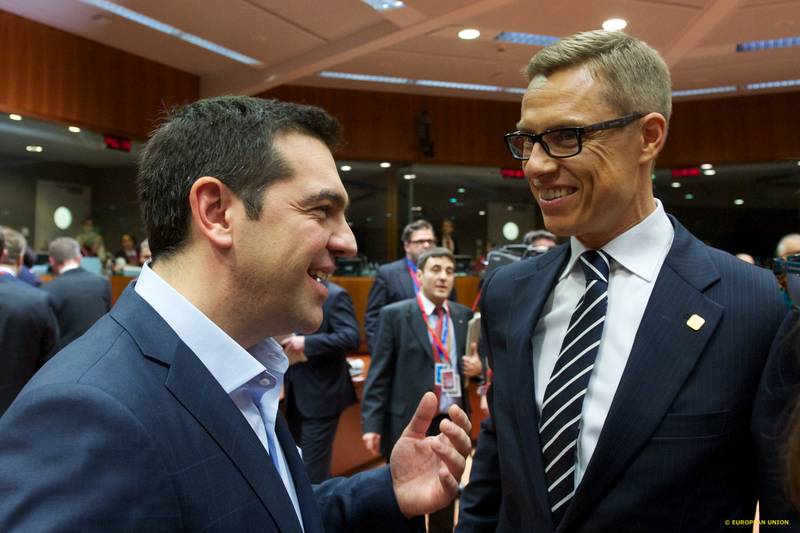 mprove significantly. To some, the forecast could sound too rosy but the situation in Ireland and Portugal shows that optimism is grounded.
mprove significantly. To some, the forecast could sound too rosy but the situation in Ireland and Portugal shows that optimism is grounded.
Therefore it is important to underscore the coincidence that while the Eurogroup will be seeking a solution to the latest Greek problem, the ministers of finance of the euro area will also discuss the formal request of the Portugal government to pay back more than half of its loans to the IMF earlier. Lisbon is expected to receive the approval of the Eurogroup. Portugal's exit from the programme will follow the same principles and precedents of Ireland. So, Greece is facing the two sides of the same coin - some in the euro area are applying the cure in a constructive dialogue with the doctor whereas others are refusing the treatment, the doctor and everything. As the Portuguese economic daily Diário Económico commented last week, "this shows that there are alternatives to the new Greek government's approach". It is important to note also that the economic forecast for Portugal is not as rosy as for Greece. The expected growth of Portugal's economy is not as big as for Greece - 1.6% this year and 1.7% in 2016. The budget of Portugal will continue to generate deficits, although within the limits of the Stability and Growth Pact and the tempo of debt reduction will be much slower than the Greek one.
 Klaus Regling | © Council of the EU
Klaus Regling | © Council of the EU Mario Centeno | © Council of the EU
Mario Centeno | © Council of the EU Mario Centeno | © Council of the EU
Mario Centeno | © Council of the EU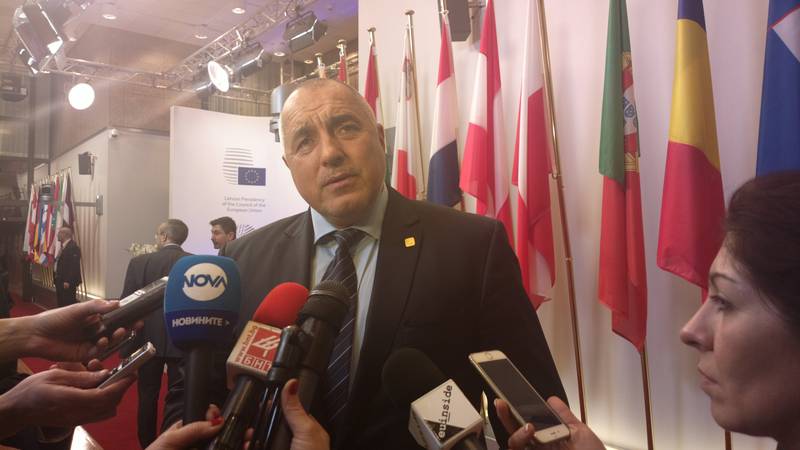 Boyko Borissov | © euinside
Boyko Borissov | © euinside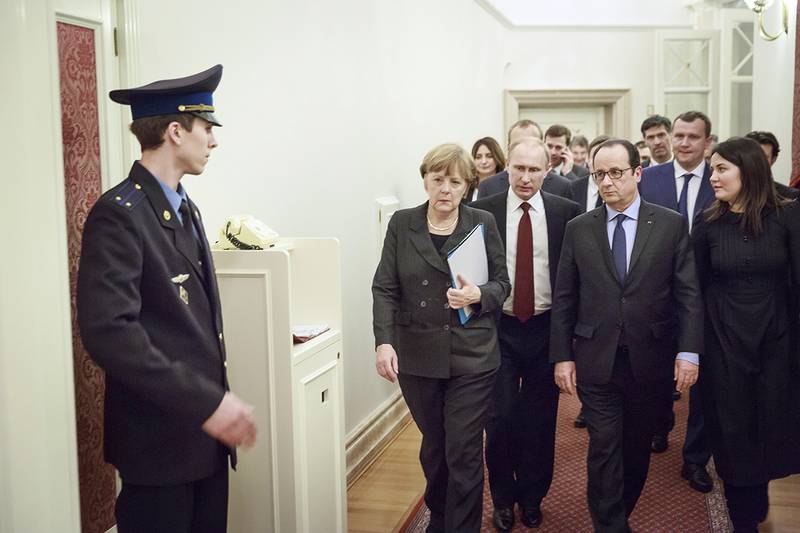 Angela Merkel, Vladimir Putin, Francois Hollande | © Bundesregierung
Angela Merkel, Vladimir Putin, Francois Hollande | © Bundesregierung